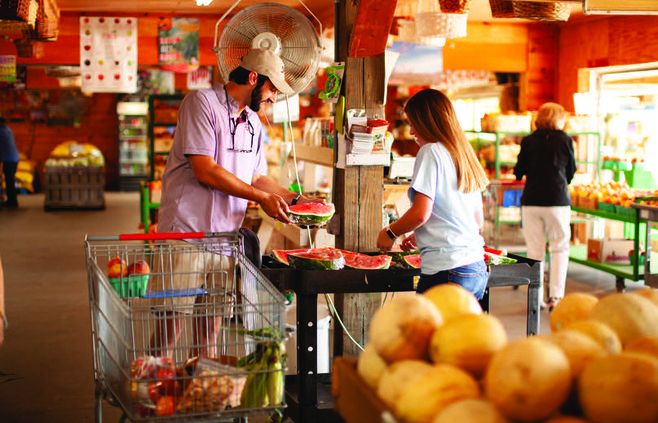Twice a week for the past eight years, Kathleen Holdash heads to the Hall County Farmers Market, arriving long before the farmers and crafters bring their locally grown produce and hand-made items. Local growers bring the best of their wares, from just-picked beans and vine-ripened tomatoes to homemade breads and juicy peaches.
“Many of our farmers have backyard gardens or small farms of 2 to 5 acres in Hall and the counties adjacent to Hall,” says Kathleen, who as manager of the market has visited every farm represented there. “We don’t allow people to bring produce or products they’ve purchased elsewhere for resale. Everything is grown right here in Northeast Georgia.”
She says that the farmers who participate are the ones who grow the produce, so they can tell purchasers about their farms, how they grow their cucumbers and what attracted them to the farming lifestyle. “There’s been an upswing in farm-to-table fresh-picked produce in recent years,” Kathleen says. “People want to know where their food comes from and that it’s fresh and grown safely.”
The market, celebrating its 48th year, also offers seedlings for sale, as well as a regular Ask-a-Master Gardener Booth to answer gardening questions from the public. “We’re all about encouraging people to buy local, support the community and farm families who are committed to the land. The people who come here can find the freshest, most flavorful produce and that’s what keeps customers coming back.”
In addition to farmers markets, many larger farms offer the chance to purchase directly and even tour their fields or pickyour-own produce. Jaemor Farms, with locations in Alto and in Commerce, attracts people from across North Georgia to purchase fresh peaches, homemade peach and strawberry soft-serve ice cream, and a plethora of locally grown produce. Jaemor is known for its peaches and apples, jams, jellies, breads and pies.
It offers farm tours and family events throughout the year. “Farming has become cool again and people want to know more about how their food is grown and where it comes from,” says Caroline Lewallen, marketing coordinator at Jaemor. “That’s why there’s been such an increase in agritourism, with people participating in farm-related activities.” Caroline says that the most active time for farm tours across the region is fall, with pumpkin patches, corn mazes, hayrides, apple picking and other events. “This is an excellent way to spend some time at a farm, bring home fresh produce and make family memories.”
Agritourism combines Georgia’s top two economic drivers—agriculture
and tourism—and it means big business across the state.

If you don’t want to go to a farm or farmers market, you can order locally grown produce online through services like Northeast Georgia Locally Grown. Register free online, then each Friday, participants receive an email listing the fresh offerings from nearly 40 farms in the area. “The farmers control what they offer for sale each week,” says co-manager Andrew Linker from Cleveland. “They set their prices, pick the produce, package it based on the orders they receive and then deliver it to us. Each Wednesday, we drop off the orders at three locations—the Northeast Georgia History Center in Gainesville, Mill Gap Farm in Rabun County and Grace Calvary Episcopal Church in Habersham County.”
Andrew says that the service has become popular and it’s a good way to tap into fresh produce directly from the farmers who grow it in the 13-county area. “We have a strict policy to make sure every farm is chemical free,” he says. “We also don’t allow any resold food. Buying local means your products have the longest shelf-life possible, the freshest flavors and the best nutrition. Because we have so many excellent farms and growers in Northeast Georgia, it just makes sense to buy local and support farmers and their families.”


